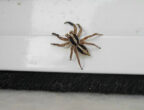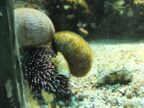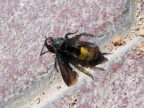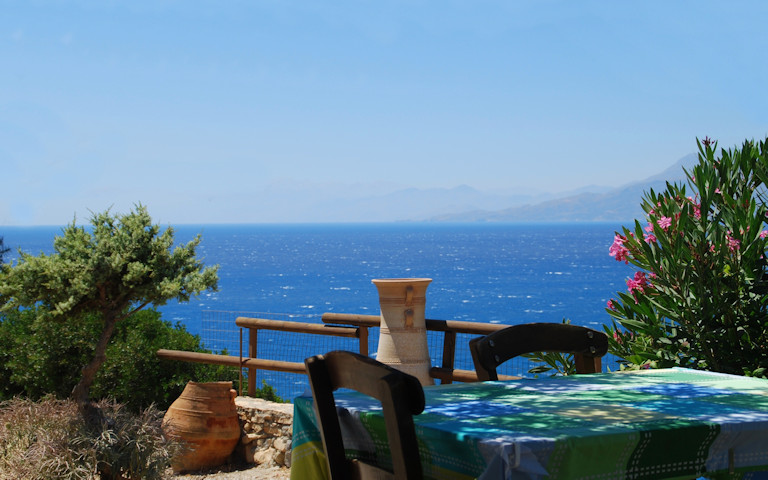Crete is home to lots of unique and interesting wildlife, but the first question you might have is does any of it pose a threat to tourists. The simple answer is no, but as usual it is worth knowing a little more…
Snakes
আছে 4 species of snake on Crete. None of them pose any danger to humans
Spiders & Scorpions
 There are some theoretically venomous spiders on Crete but I have been unable to locate any reports of any causing harm to humans. The only reports of harm to humans from spiders on Crete are related to small “jumping spiders” that can bite at night and the bite can frequently become infected which requires treatment. The bite itself is not venomous and the number of reports are very low.
There are some theoretically venomous spiders on Crete but I have been unable to locate any reports of any causing harm to humans. The only reports of harm to humans from spiders on Crete are related to small “jumping spiders” that can bite at night and the bite can frequently become infected which requires treatment. The bite itself is not venomous and the number of reports are very low.
There are several species of scorpions on Crete and their stings can be painful but are very unlikely to cause lasting damage unless you are unlucky enough to be allergic. In nearly 40 years of visiting Crete I have never seen one.
Sharks
The Mediterranean is home to many species of shark including large ones that have been known to attack humans in other parts of the world. However they are very rarely seen close to shore and there are no known reports of shark attacks near Crete. Shark attacks are globally very rare and generally occur in areas where sharks are fed “chum” to attract them for cage divers to see. This is an activity that does not occur on Crete.
Lionfish
 Lionfish are found in the sea around Crete — I have personally seen them on a number of occasions. They are venomous and can sting but are highly unlikely to do so unless significantly threatened. As they are faster and more agile than you in the water it is quite hard to threaten them accidentally. Their sting is very unlikely to cause lasting damage to a healthy human but it is extremely painful and well worth avoiding — admire them from a safe distance.
Lionfish are found in the sea around Crete — I have personally seen them on a number of occasions. They are venomous and can sting but are highly unlikely to do so unless significantly threatened. As they are faster and more agile than you in the water it is quite hard to threaten them accidentally. Their sting is very unlikely to cause lasting damage to a healthy human but it is extremely painful and well worth avoiding — admire them from a safe distance.
Sea Urchins
 There are lots of sea urchins in the sea around Crete and stepping on them is very unpleasant, but not harmful in the long term. A little care is all it takes to avoid them which is best for both you and them.
There are lots of sea urchins in the sea around Crete and stepping on them is very unpleasant, but not harmful in the long term. A little care is all it takes to avoid them which is best for both you and them.
Scorpion fish & weaver fish
These fish live on the bottom of the sea and are unlikely to bother you unless severely threatened. They both have a painful sting but cause no long term harm unless you are unlucky enough to be allergic
Jellyfish
 Jellyfish do occur in the sea around Crete but are rare due to the natural currents. The ones that are occasionally encountered can cause irritating stings similar to nettles but pose no lasting danger. There are very few recorded sightings of dangerous jellyfish anywhere in the Mediterranean.
Jellyfish do occur in the sea around Crete but are rare due to the natural currents. The ones that are occasionally encountered can cause irritating stings similar to nettles but pose no lasting danger. There are very few recorded sightings of dangerous jellyfish anywhere in the Mediterranean.
Dogs
There are many stray dogs on Crete but the ones found in populated areas have learned to behave as the local population would likely kill any animal acting dangerously. Dogs seen up in the mountains can be aggressive but are usually chained up and seen at a distance from a car window. There have been no reported cases of rabies on Crete.
Badgers!
There are badgers on Crete and if threatened they could cause notable harm to a human. However the badgers are rare and live in isolated environments away from humans. The only circumstance where you might threaten one would be if you were to enter an area where it had offspring, উদাঃ. an isolated mountain cave. There are no known reports of attacks on humans by badgers in Crete.
Bears, Wolves
There are no bears or wolves on Crete. They can be found in the mountains of the mainland of northern Greece and neighbouring balkan countries but even there they are very rare.
Birds
 No birds pose a genuine threat to humans anywhere in the world. The largest bird on Crete is the lammergeier or bearded vulture, which is extremely rare. Despite myth to the contrary, like other vultures the lammergeier does not attack or eat living animals, it collects the bones of dead animals, which it drops from great heights to break open, and then swallows the pieces which are digested by extremely acidic digestive juices.
No birds pose a genuine threat to humans anywhere in the world. The largest bird on Crete is the lammergeier or bearded vulture, which is extremely rare. Despite myth to the contrary, like other vultures the lammergeier does not attack or eat living animals, it collects the bones of dead animals, which it drops from great heights to break open, and then swallows the pieces which are digested by extremely acidic digestive juices.
Wasps, Bees, Hornets
 Crete has all of these flying insects. The bees are as friendly as elsewhere and produce famous and superb honey. The wasps are very rarely problematic, although they can be a nuisance when eating outdoor in some mountain tavernas during daylight hours. The ones most often seen are not the classic “yellowjacket” wasps that frequently sting people in northern Europe in autumn. Hornets do occur in Crete and their sting is exceedingly unpleasant, but mercifully rare. I am only aware of 1 case of hornet sting in Crete amongst the large group of residents I know. If you do encounter hornets the best policy is to leave them to it and go elsewhere — they are unlikely to follow. The one key thing to think about with regard to stinging insects is to always decant your drinks into a glass. If you usually drink your beer / cola from a can beware that a wasp that has flown into it cannot be seen and may sting you in the throat if you accidentally swallow it. Whilst highly unlikely, this could also prove fatal if it were to cause a significant swelling (as if often the case with stings). This is good practice whenever drinking from a can outdoor regardless of what country you are in.
Crete has all of these flying insects. The bees are as friendly as elsewhere and produce famous and superb honey. The wasps are very rarely problematic, although they can be a nuisance when eating outdoor in some mountain tavernas during daylight hours. The ones most often seen are not the classic “yellowjacket” wasps that frequently sting people in northern Europe in autumn. Hornets do occur in Crete and their sting is exceedingly unpleasant, but mercifully rare. I am only aware of 1 case of hornet sting in Crete amongst the large group of residents I know. If you do encounter hornets the best policy is to leave them to it and go elsewhere — they are unlikely to follow. The one key thing to think about with regard to stinging insects is to always decant your drinks into a glass. If you usually drink your beer / cola from a can beware that a wasp that has flown into it cannot be seen and may sting you in the throat if you accidentally swallow it. Whilst highly unlikely, this could also prove fatal if it were to cause a significant swelling (as if often the case with stings). This is good practice whenever drinking from a can outdoor regardless of what country you are in.
Mosquitoes
Crete does unfortunately suffer from mosquitoes. Some years they are mercifully low in number (if there has been a heatwave above 40C it will usually kill the majority of them are they are unable to stay cool). They tend to bite at night and can be repelled reasonably effectively with standard repellent. I have found that drinking tonic water containing quinine is also an effective way to keep them away, as is drinking tsikoudia (Raki). Lastly, mosquitoes find flying difficult in windy conditions so a good power ceiling fan is better at keeping them away at night than using air conditioning. If you have a good fan you may find the air conditioning is comfortable set to as high as 25C which is also more pleasant than a more powerful setting as the dehumidified air is less pleasant and less healthy to breathe.
Green shield bugs
 There are small green beetles on Crete that are rumoured to release a terrible smell if killed, or in even if touched. There are many species of shield bug and I am yet to encounter one that produces any smell. If you encounter one the best bet would be to trap it with a glass and paper and release it outside.
There are small green beetles on Crete that are rumoured to release a terrible smell if killed, or in even if touched. There are many species of shield bug and I am yet to encounter one that produces any smell. If you encounter one the best bet would be to trap it with a glass and paper and release it outside.
Cockroaches
There are plenty of cockroaches on Crete. They can’t cause any direct harm but, like flies, they do spread disease so they are undesirable neighbours. They can be easily killed but if a female is pregnant this can distribute her eggs which are barely large enough to see, and so tend to get spread around on your shoe and may later hatch so it is best to get the ‘roach outside before dispatching it.


উত্তর দিন